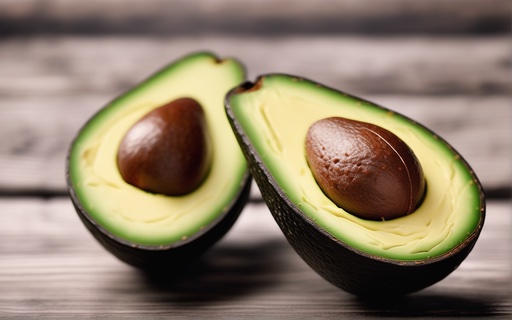Internet Asks: "Calories in Small Avocado"
In the health-conscious world, avocados are celebrated not only for their rich, creamy texture and versatility but also for their nutritional profile. A common question among diet enthusiasts and health-conscious individuals is: How many calories are in a small avocado? Understanding the caloric content of avocados can be crucial for those monitoring their daily intake for weight management or nutritional purposes.
sponsored links

Caloric Breakdown of a Small Avocado
The calorie content in avocados can vary based on their size. According to the United States Department of Agriculture (USDA), a small avocado (weighing approximately 150 grams) contains about 234 calories, making it a high-energy food. This caloric value can be a crucial consideration for those who are mindful of their daily caloric intake.
Macronutrients:
- - Fat: Avocados are rich in healthy fats, particularly monounsaturated fats. A small avocado has about 21 grams of total fat, which includes 3 grams of saturated fat, 1 gram of polyunsaturated fat, and about 15 grams of monounsaturated fat.
- - Protein: A small avocado provides around 3 grams of protein.
- - Carbohydrates: It contains about 12 grams of carbohydrates, predominantly from fiber.
- - Fiber: With about 9 grams of dietary fiber, avocados are an excellent source for aiding digestion and promoting satiety.
Vitamins and Minerals:
- - Vitamin K: Essential for blood clotting and bone health, a small avocado delivers approximately 31 micrograms of Vitamin K, which is about 39% of the Daily Value (DV).
- - Folate: With about 90 micrograms, it provides roughly 23% of the DV for folate, beneficial for cell function and tissue growth.
- - Vitamin C: Essential for immune function and skin health, it offers about 10 mg, or 11% of the DV.
- - Potassium: With 708 mg of potassium, avocados are a great source to support heart health, contributing to 15% of the DV.
- - Other Nutrients: Avocados also contain smaller amounts of magnesium, vitamin E, vitamin B-6, and iron.
Why Understanding Avocado Calories Matters
Knowing the calorie content in avocados is essential for:
- - Weight Management: For individuals tracking their calorie intake for weight loss or maintenance, understanding the caloric contribution of avocados to their diet is vital.
- - Nutritional Planning: Avocados are packed with nutrients, and knowing their calorie count helps in planning a balanced and nutritious diet.
sponsored links
Health Benefits of Avocados
Avocados are not only about their calorie content; they are packed with beneficial nutrients:
-
- Heart Health: The monounsaturated fats in avocados are beneficial for heart health.
-
- Weight Management: High fiber content contributes to feelings of fullness, potentially aiding in weight management.
-
- Blood Sugar Regulation: The low carbohydrate and high fiber content can help in managing blood sugar levels.
-
- Skin and Eye Health: Rich in vitamins E and C, avocados contribute to healthy skin and eyes. The antioxidants present in avocados can protect your skin from UV damage and improve its elasticity and hydration.
-
- Digestive Health: The high fiber content not only aids in digestion but also helps maintain a healthy gut microbiome.
-
- Cognitive Function: Avocados contain folate and vitamin K, which are known to improve cognitive functions, especially memory and concentration.
Incorporating Avocados into Your Diet
Given their nutritional profile, avocados can be a healthy addition to various meals:
-
- Classic Guacamole: Mash ripe avocados with lime juice, chopped onions, tomatoes, cilantro, and season with salt and pepper for a perfect dip or spread.
-
- Avocado Toast: Spread mashed avocado on whole-grain toast and top with poached eggs, red pepper flakes, and a sprinkle of sea salt for a nutritious breakfast.
-
- Avocado Salad: Combine sliced avocado with mixed greens, cherry tomatoes, cucumbers, and a vinaigrette dressing for a refreshing salad.
-
- Avocado Smoothie: Blend avocado with banana, spinach, Greek yogurt, and almond milk for a creamy and healthy smoothie.
-
- Stuffed Avocados: Fill avocado halves with a mixture of cooked quinoa, black beans, corn, and topped with a sprinkle of cheese for a wholesome meal.
-
- Avocado Pasta: Blend avocado with garlic, basil, lemon juice, and olive oil for a creamy pasta sauce.
-
- Chocolate Avocado Mousse: Mix pureed avocado with cocoa powder, a sweetener of your choice, and a touch of vanilla extract for a decadent yet healthy dessert.
Conclusion
While a small avocado contains about 234 calories, its nutritional value extends far beyond just calories. Packed with healthy fats, fiber, vitamins, and minerals, avocados are a nutritious addition to any diet. Understanding their caloric content helps in making mindful dietary choices, especially for those managing calorie intake for weight-related goals.
Disclaimer: This article is for informational purposes only and is not intended as medical or dietary advice. Always consult a healthcare professional or nutritionist for personalized dietary recommendations, particularly if you have specific health conditions or dietary restrictions.
sponsored links
References
1. USDA Food Data Central. "Avocados, raw, all commercial varieties." https://fdc.nal.usda.gov/fdc-app.html#/food-details/171705/nutrients.
2. California Avocado Commission. https://californiaavocado.com/
3. National Institutes of Health Office of Dietary Supplements: Vitamin and Mineral Fact Sheets. https://ods.od.nih.gov/factsheets/list-VitaminsMinerals/
4. Harvard T.H. Chan School of Public Health. Avocados. https://www.hsph.harvard.edu/nutritionsource/avocados/
People are also reading...
Avocado in Spanish
Pink Avocado
Avocado Toast Dunkin
Avocado Bacon Burger
Does Dark Chocolate Have Caffeine in It?
See the answer to: "Does Dark Chocolate Have Caffeine in It?"
Matcha Drinks at Starbucks
Matcha Green Tea Latte Starbucks Calories
See the answer to: "Matcha Green Tea Latte Starbucks Calories"
Starbucks Matcha Ingredients
Matcha Starbucks Drinks
Calories In Steak?
Chicken Taco Calories?
Does Hot Chocolate Have Caffeine?
Are Mangoes Acidic?
Orange Juice pH?
Calories In a Grilled Cheese?
Ready to level-up?
Create meal plans 10x faster, follow up with your clients through our mobile app, and never struggle with meal planning or recipe management again.